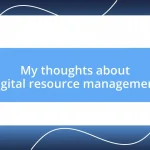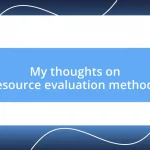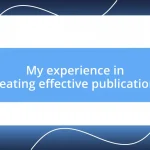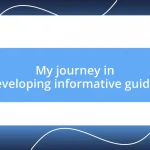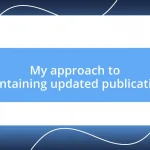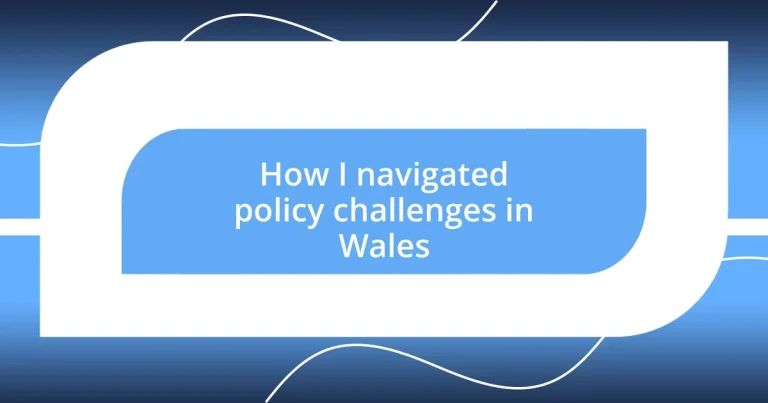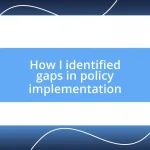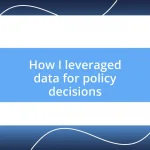Key takeaways:
- Identification of policy challenges in Wales, including the disconnect between local needs and regional policies, and the complexities of resource allocation.
- The importance of stakeholder engagement and transparency in developing effective policy solutions, fostering collaboration among diverse voices.
- Continuous monitoring and sharing of lessons learned enhance policy implementation, adaptability, and community involvement, leading to more sustainable and effective outcomes.
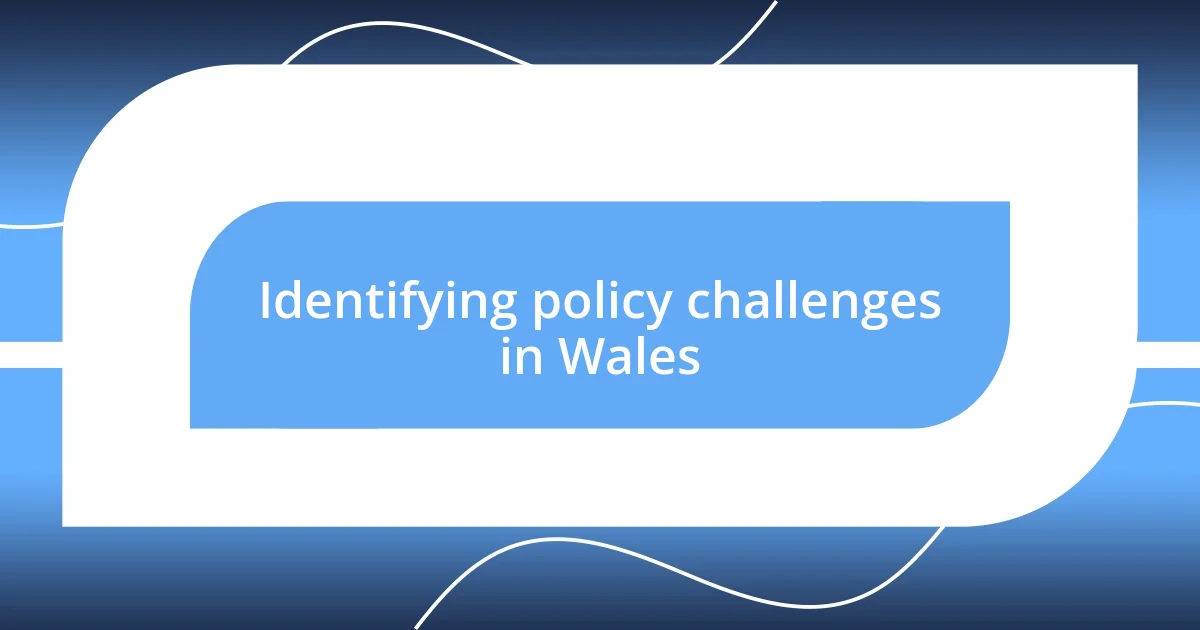
Identifying policy challenges in Wales
In my experience, one of the most daunting policy challenges in Wales is the discrepancy between local needs and regional policies. I remember attending a town hall meeting where frustrated residents voiced their concerns about a lack of representation in decision-making. How can we expect effective policy to emerge when the very people it’s meant to serve feel unheard?
I’ve also observed that resource allocation often doesn’t match the socio-economic realities of different communities. For instance, during my time working with a local charity, I saw firsthand how areas with high unemployment lacked sufficient funding for skills training programs. Has anyone else felt that pressure when trying to advocate for change in such situations?
Another challenge that stands out is the complexity of the legislative process in Wales. When I was involved in policy discussions, I often felt overwhelmed by the layers of governance that seemed to stifle innovation. Isn’t it puzzling how those barriers can deter even the most passionate advocates from pursuing vital reforms?
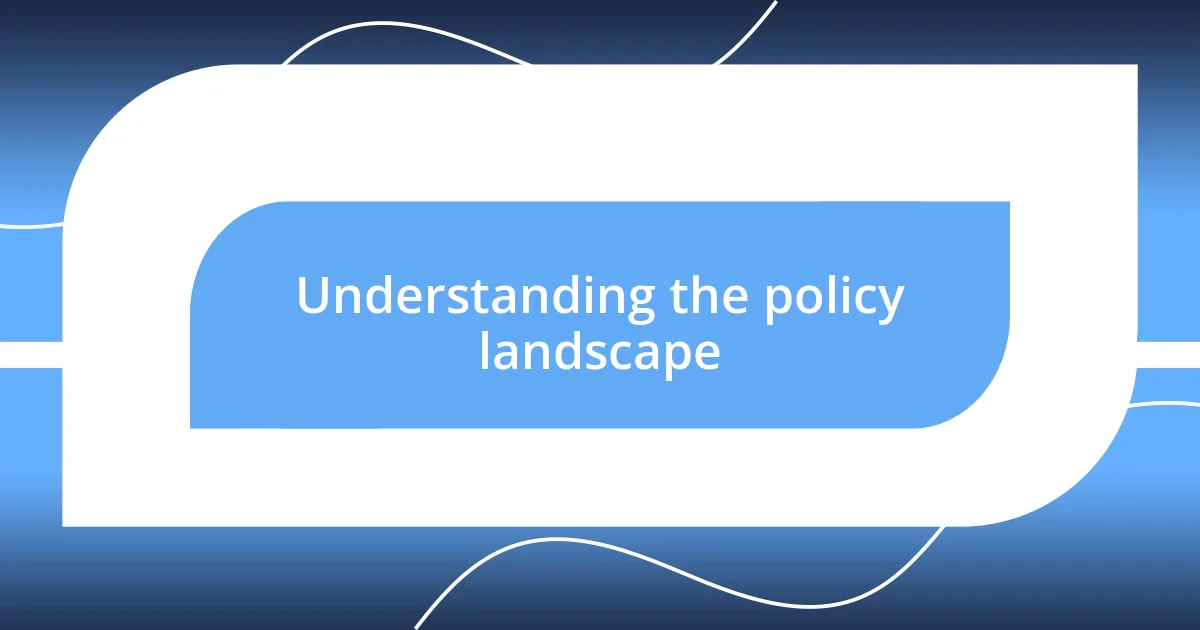
Understanding the policy landscape
Understanding the policy landscape in Wales requires a multifaceted approach. I vividly recall a workshop I attended that shed light on the interconnection between national policies and local needs. It struck me how decisions made in Cardiff can sometimes feel distant from the realities faced in smaller communities. This disconnect can breed frustration, especially when residents are left grappling with policies that don’t seem to fit their unique circumstances.
Key factors to consider include:
- Decentralization: Local governments in Wales wield considerable power, making it vital to understand their priorities.
- Stakeholder Engagement: The importance of involving community members in the policy-making process cannot be overstated. Their insights often illuminate gaps in the current system.
- Resource Allocation: Acknowledging how resources are distributed across various sectors helps in identifying areas in need of urgent attention. I remember a conversation with a community leader who passionately highlighted the disparity in funding for mental health services.
- Legislative Framework: Familiarizing oneself with the complex web of laws can demystify the process and empower advocates to navigate it more effectively. It was through hours spent deciphering these regulations that I finally began to feel more equipped to engage meaningfully in discussions.
Each of these elements shapes the landscape of policy-making in Wales, guiding how we address challenges and implement solutions.
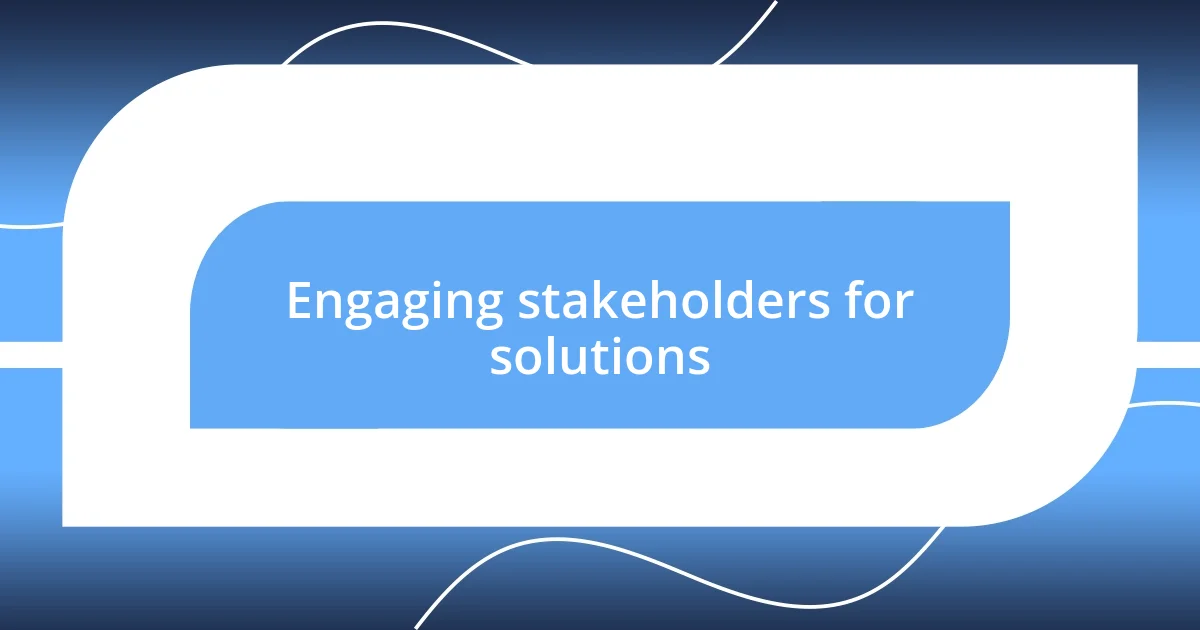
Engaging stakeholders for solutions
Engaging stakeholders is crucial for developing effective solutions to policy challenges. In one collaborative meeting I attended, we gathered various community representatives, from school teachers to health care workers. The insights shared were eye-opening; each stakeholder brought a unique perspective that illuminated issues I hadn’t even considered. It reminded me of the power of collective expertise and how vital it is to foster a sense of collaboration.
During another experience, I worked closely with a local business leader who expressed frustration over feeling alienated from the policymaking process. His views resonated with many community members, highlighting the importance of including diverse voices. I realized how empowering it is when stakeholders feel valued. Since then, I’ve made it a point to advocate for inclusive discussions that bring together voices from all walks of life, because only then can we truly craft policies that resonate with everyone.
Furthermore, I learned that transparency plays a key role in stakeholder engagement. While working on a community project, our team made it a priority to keep everyone informed about our objectives and progress. I’ll never forget the excitement when community members felt genuinely invested in the outcome. This experience taught me that when stakeholders are engaged and informed, they don’t just become participants; they become passionate advocates for sustainable solutions.
| Engagement Strategy | Description |
|---|---|
| Collaborative Meetings | Gathering diverse stakeholders fosters shared insights and problem-solving. |
| Inclusion of Voices | Ensuring marginalized voices are heard creates well-rounded policies. |
| Transparency in Communication | Keeping stakeholders informed strengthens trust and advocacy. |
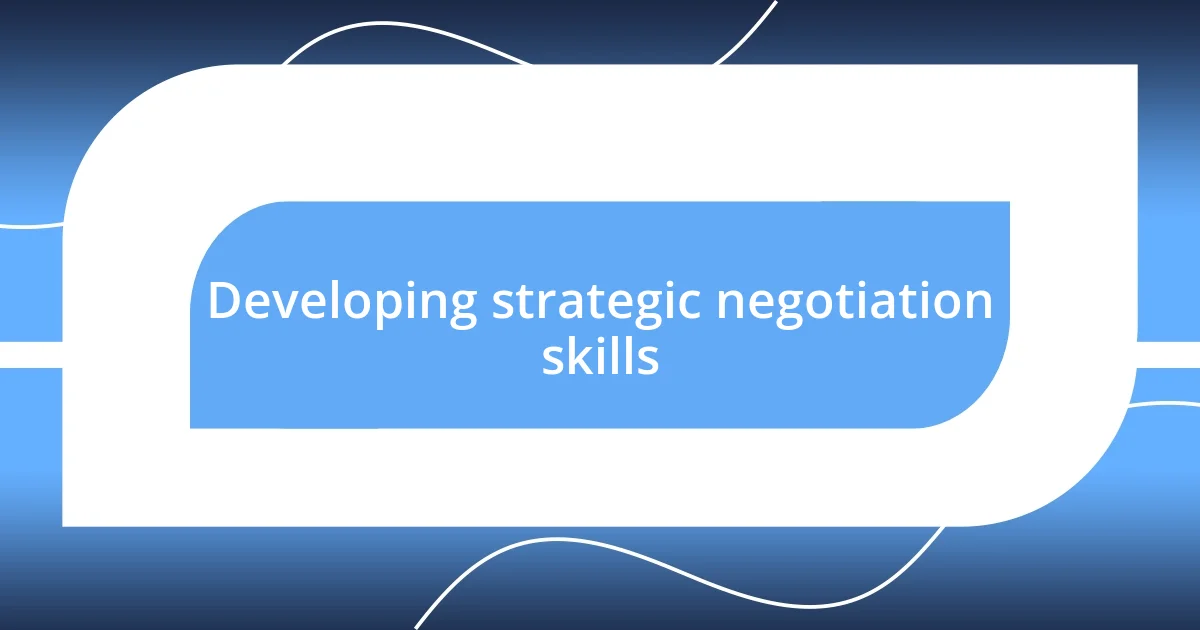
Developing strategic negotiation skills
Developing strategic negotiation skills is essential for anyone looking to make a meaningful impact in policy discussions. I remember a particular negotiation session where our team held firm on specific community needs, yet I felt the tension in the room. Instead of succumbing to that pressure, we chose to listen actively, asking questions that revealed the underlying concerns of the other party. This approach not only eased the atmosphere but helped us uncover potential avenues for compromise that would have gone unnoticed otherwise. Have you ever found that a simple conversation can shift a tense negotiation into a collaborative dialogue?
In my experience, preparation is key to successful negotiations. Before each meeting, I invest time in researching not just our position but also the interests of the other side. I recall spending hours pouring over data and reports before a critical discussion about funding for local services. This preparation was crucial; it empowered me to present compelling arguments, but more importantly, it allowed me to anticipate potential objections. By articulating our goals while acknowledging the concerns of others, I felt a sense of confidence radiating throughout the negotiation.
I’ve also discovered that emotional intelligence plays a significant role in negotiations. There was a time when I misread the emotions of a counterpart, leading to a misstep that almost derailed our progress. I learned to pay close attention to not just what was being said, but how it was delivered. This awareness transformed my approach. Now, I consciously strive to create an empathetic environment, recognizing that building rapport can lead to more effective negotiations. This shift in perspective has enriched my interactions—what if we viewed our negotiation partners as allies rather than opponents?
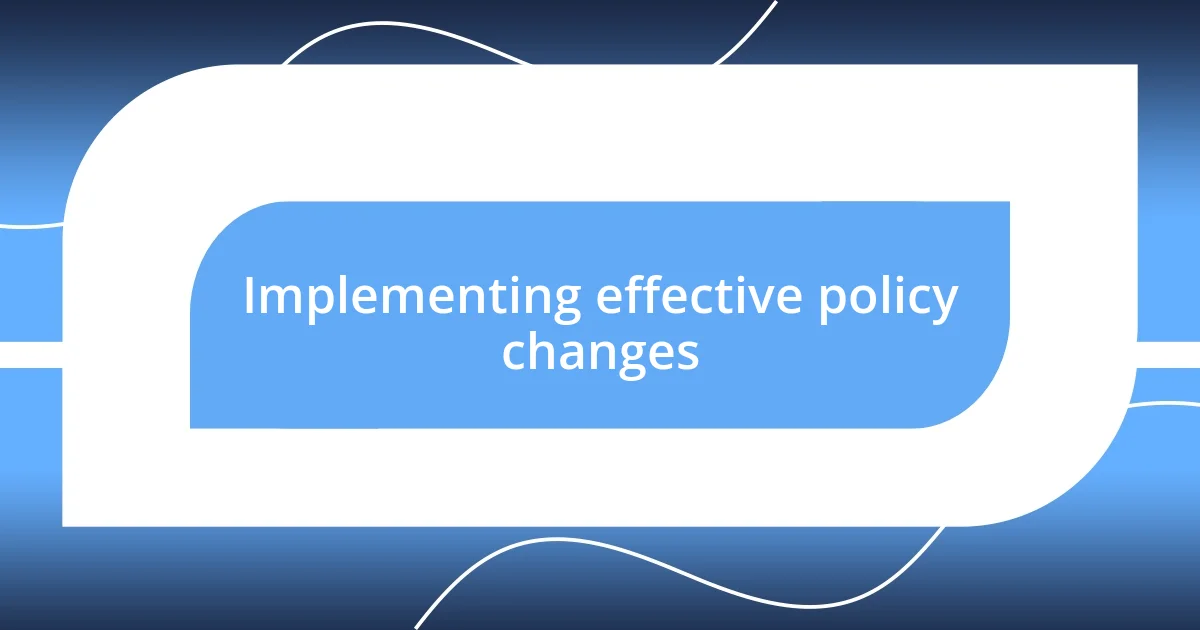
Implementing effective policy changes
Implementing effective policy changes requires a willingness to adapt and evolve. I remember when we introduced a new local initiative aimed at improving public transportation. Initially, there was resistance, but by organizing workshops where community members could voice their concerns and ideas, we began to see shifts in perspective. How often do we overlook the power of direct dialogue in fostering acceptance for change?
In my experience, pilots or trial runs are invaluable tools for implementing policy adjustments. When we launched a small-scale version of the public transportation project, it provided an opportunity to gather real-time data and make necessary tweaks before a full rollout. This experience illustrated how hands-on trials can demystify policy changes and build trust with stakeholders by visibly addressing their feedback. Did you know that incremental changes can often smooth the path for more significant reforms?
Monitoring and evaluating outcomes post-implementation is equally crucial. After the full-scale launch, we set benchmarks and regularly assessed community feedback. One of the most enlightening aspects of this process was discovering unintended benefits, like increased community engagement in service planning. This kind of iterative feedback loop not only reinforces the importance of adaptability but also underscores how effective policies can evolve through continuous reflection and refinement. Are we truly ready to embrace change as a collaborative journey rather than a destination?
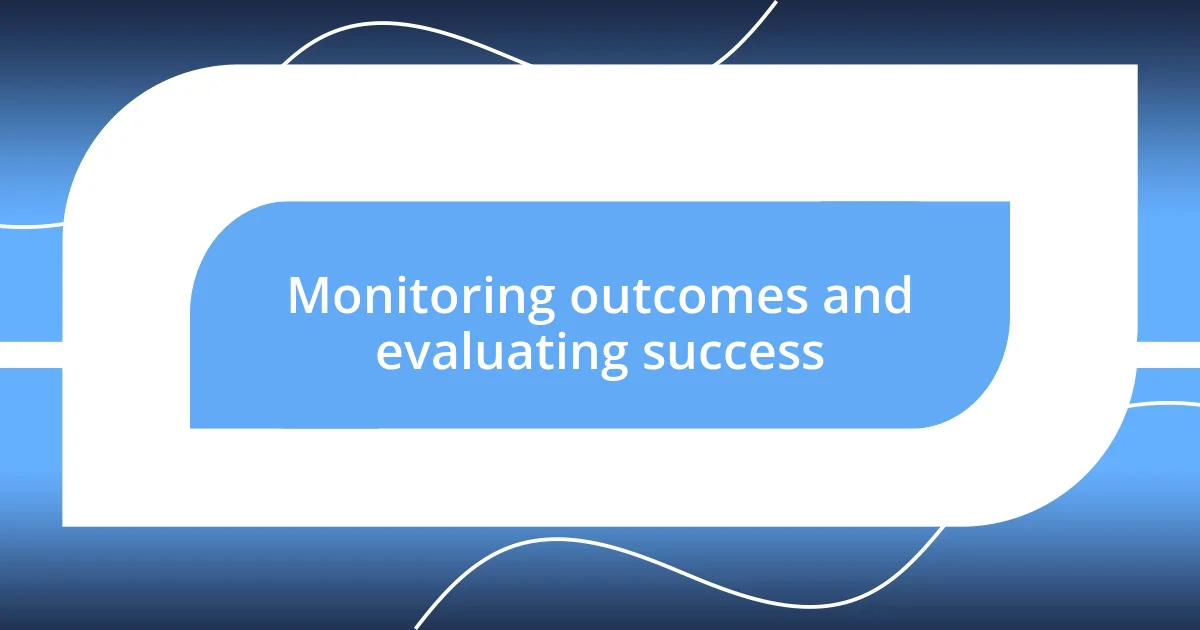
Monitoring outcomes and evaluating success
I’ve found that establishing clear metrics for success is vital when monitoring outcomes. During one project aimed at reducing youth unemployment, we defined specific goals—like the number of job placements and workshops held. Tracking these outcomes not only highlighted our progress but also allowed us to pivot our strategies when something wasn’t working. Have you ever noticed how a simple number can sometimes tell a more significant story than any narrative could?
Reflecting on my experiences, I realized that gathering qualitative feedback often provides deeper insights than quantitative data alone. For example, after launching our community health initiative, I personally interviewed participants about their experiences. Their heartfelt stories revealed challenges we had overlooked in our initial assessments. Isn’t it fascinating how people’s voices can bring richer context to our data-driven decisions?
Another powerful lesson came from involving stakeholders in the evaluation process. When I invited community leaders to review our outcomes, they offered perspectives that not only validated our efforts but also illuminated areas for further improvement. Their engagement fostered a sense of ownership that I hadn’t anticipated. Can we truly measure success without incorporating those who are directly affected by our policies?
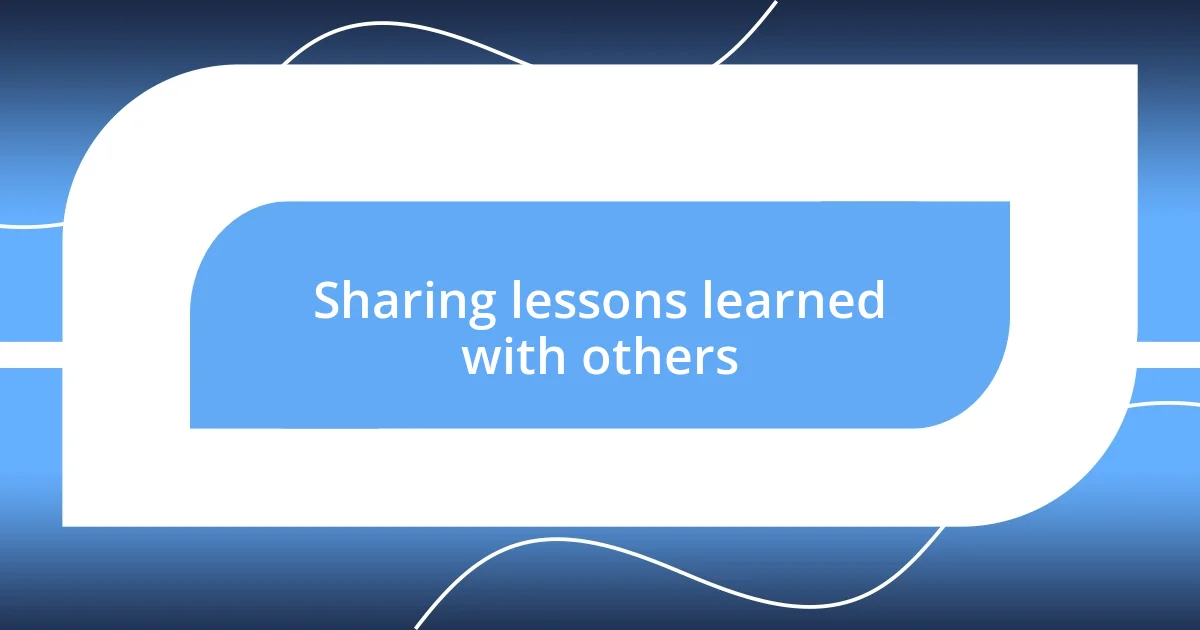
Sharing lessons learned with others
One of the most rewarding experiences in sharing lessons learned has been during informal mentorship sessions with emerging leaders in my community. I vividly recall a discussion where we unpacked the initial hurdles I faced while implementing a youth engagement program. Listening to their reactions—the surprise at my missteps and the enthusiasm for my successes—made me realize how invaluable these candid conversations can be for both parties. Have you ever seen how openness can spark genuine inspiration?
I also took part in a local conference where I shared my experiences tackling policy challenges. Hearing feedback from attendees who faced similar obstacles was eye-opening. They expressed how they built on my lessons and adapted them to their unique contexts. It was an incredible reminder that we’re often closer to solutions when we collaborate. Doesn’t it feel empowering to know that sharing stories can lead to collective growth?
As I reflect on the impact of sharing my journey, I’m constantly reminded of the importance of creating a supportive network. I initiated a monthly gathering where various stakeholders recount their experiences. One gathering stands out to me; a participant shared how a simple strategy I mentioned revolutionized their approach to community outreach. That moment illuminated the ripple effect of our shared experiences and how, together, we can create lasting change. How often do we truly grasp the power of connection in driving innovation?
